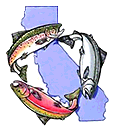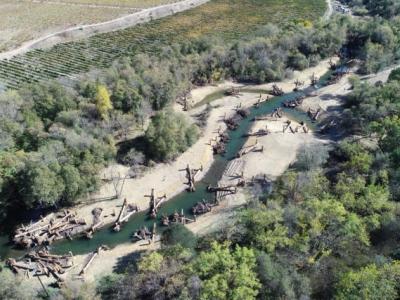Summertime Blues: Salmonid Survival and Ecosystem Response at the Base of the Hydrograph
Session Coordinators:
Mariska Obedzinski and Sarah Nossaman Pierce, CA Sea Grant
Flow impairment has been recognized as a bottleneck to salmon recovery in many of California’s coastal stream systems, but we still have much to learn about the specific variables that drive juvenile salmonid condition and survival in intermittent streams, where average daily flow can persist in just tenths to hundredths of a cubic foot per second over the dry summer months. This session will focus on current scientific research investigating environmental and biological responses to changes in streamflow at the low end of the hydrograph. Collectively, this work contributes to a better understanding of the effects of flow impairment on salmonids and the habitat on which they depend, in order to support effective management of our limited water resources.
Impacts of Low Summer Streamflow on Salmonids Rearing in Russian River Tributaries
Mariska Obedzinski, CA Sea Grant
Effects of Extreme Drought on Juvenile Coho Salmon Survival in the Russian River
Ross Vander Vorste, PhD, UC Berkeley
The Effects of Flow Augmentation on Invertebrate Drift, Salmonid Foraging Behavior and Inter-Pool Movement in a Mediterranean Stream
Wes Slaughter, Keane Flynn and Gabriel Rossi, UC Berkeley
Flows That Support Coho Smolt Outmigration: Hydraulic Controls on Downstream Movement in the Russian River Watershed, CA
Brian Kastl, UC Berkeley
Beyond Flow Regimes: Dissolved Oxygen Controls on Juvenile Salmonid Health and Persistence
Cleo Woelfle-Erskine, University of WA
Dynamics That Influence Dissolved Oxygen Concentrations in Salmonid Rearing Pools and Possible Implications for Management
Sarah Nossaman Pierce, CA Sea Grant and Bryan McFadin, North Coast Regional Water Quality Control Board

